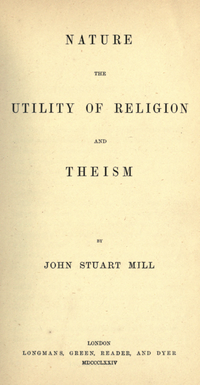 | |
| Author | John Stuart Mill |
|---|---|
| Language | English |
| Subject | Nature, religion, theism |
| Genre | Philosophy |
| Published | 1874 |
| Publisher | Longmans, Green, Reader, and Dyer |
| Pages | xi + 257 |
| OCLC | 457883039 |
Three Essays on Religion: Nature, the Utility of Religion, and Theism is an 1874 book by the English philosopher John Stuart Mill, published posthumously by his stepdaughter Helen Taylor, who also wrote the introduction. It is made up of three essays: "Nature" and the "Utility of Religion", were both written between 1850 and 1858, while "Theism" was composed between 1868 and 1870.[1] The book is critical of traditional religious views, instead advocating for a "religion of humanity".[2]
Essays
"Nature"
In this essay, Mill argues against the idea that the morality of an action can be judged by whether it is natural or unnatural.[3] He then lays out the two main conceptions of "nature", the first being "the entire system of things" and the second being "things as they would be, apart from human intervention."[4] Mill argues that neither definition implies that nature can be a source of moral guidance.[3]
"Utility of Religion"
This essay contends that supernatural religion has an advantage of non-supernatural religion, in that it provides people with the hope that life continues after death. Despite this, Mill is suspicious of people taking advantage of those who seek to survive their deaths.[4]
"Theism"
In the book's final essay, Mill explores a number of arguments for the existence of God, using a methodology based on evidence. He argues that religion should be "reviewed as a strictly scientific question" and should be tested in the same way that other questions in science are examined. Based on his approach, Mill argues that monotheism is better than polytheism, although this does not necessarily mean that monotheism is more correct.[4]
References
- ^ McCloskey, H. J. (1971), McCloskey, H. J. (ed.), "Philosophy of Religion", John Stuart Mill: A Critical Study, Philosophers in Perspective, London: Palgrave Macmillan UK, pp. 161–173, doi:10.1007/978-1-349-15420-3_6, ISBN 978-1-349-15420-3, retrieved 2020-08-12.
- ^ Heydt, Colin. "Mill, John Stuart". Internet Encyclopedia of Philosophy. Retrieved 2020-08-12.
- ^ a b Dalrymple, Theodore (2007-11-24). "The God delusion". BMJ: British Medical Journal. 335 (7629): 1099.1–1099. doi:10.1136/bmj.39405.660243.59. ISSN 0959-8138. PMC 2094136.
- ^ a b c Van Camp, Julie C. (2009-09-24). "Review of Three Essays on Religion". Notre Dame Philosophical Reviews. ISSN 1538-1617.
External links
- Three Essays on Religion at HathiTrust Digital Library
- Three Essays on Religion at the Internet Archive
 Three Essays on Religion public domain audiobook at LibriVox
Three Essays on Religion public domain audiobook at LibriVox- John Stuart Mill at Early Modern Texts (collection of ebooks, including Three Essays on Religion)
